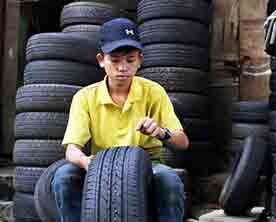Youth unemployment is a global concern. The International Labor Organization (ILO) estimates 40 percent of world’s 160 million jobless are between the ages of 15 and 24, and that 85 percent of the 1 billion in that age bracket live in developing countries. Myanmar is also facing the same problem when it comes to youth unemployment.
A unique window of opportunity opens when there are more people of working age than there are people above or below working age. In Myanmar’s case, the demographic changes have been more gradual. New population projections reveal that the dependency ratio (the number of dependents such as children and elderly per 100 economically active people) will remain almost constant at 52.5 for the next 35 year. The findings come from the 2014 Myanmar Population and Housing Census Thematic Report on Population Dynamics.
In the next four years, one million new jobs are needed to ensure employment for Myanmar’s large youth population. From 2016 to 2030, 3.7 million new jobs are needed simply to keep employment at current levels.
For Myanmar, the time to invest in jobs, education and skills training is now. Without new jobs, young people who are unable to find their place in the labor market and in society, may become disillusioned and not reach their full potential. Unless millions of new jobs are created, the prospect of even a modest demographic dividend may evaporate.
While the demand for skilled labor is high in Myanmar, there are not enough trained workers to meet the job market needs. And yet youth and young adults want skill training and employment opportunities. The government of Myanmar with the support of the international community has taken action and is committed to address the issue.
Current NLD led- Myanmar government’s 12-points economic policy document released in July 2016, also the emphasis on human resource development and vocational training. For example, Singapore Myanmar Vocational Training Institute, started in March 2015, is a joint project between the Governments of the Republic of Singapore and the Republic of the Union of Myanmar. MOU was signed between the two governments in April 2014. Twenty top graduates from SMVTI will also have opportunities to intern in companies in Singapore, starting from the new batch of students enrolled May 2016.
‘‘In creating job opportunities, the more the job opportunities, the better it is. Meanwhile it is also important to create job opportunities in local and foreign companies for skilled workers; establishing vocational trainings and vocational school for the employees which will make workers more skillful and solve the problem of scarcity of skilled labor,’’ Matt De Luca, Managing Director of JobNet.com.mm, said. Another factor is local women who are also critical to Myanmar’s development. So far, only half of women (50.5 per cent) are employed, compared to 80 per cent in Thailand. According to the 2014 Myanmar Population and Housing Census Thematic Report on Population Dynamics report, if more women entered the job market, there would be a “dramatic rise” in the country’s per capita income. By realizing the potential of women and enabling their entry into the labor market, Myanmar can generate its very own brand of economic growth driven by a “gender dividend”.
The data shows that women hold a key to Myanmar’s future prosperity. The “gender dividend” can be unlocked immediately if jobs are created. But for this to happen, there are still lots of challenges to overcome such as access to education, salary, credit or appreciation,etc.
Myanmar society is still conservative. They have gradually accepted the women in various professions but men are still unwilling to share their responsibilities at home. So most working women are overburdened and do not get the credit for the extra efforts she puts in managing the home.
“To accelerate Myanmar development, local women need equal rights to education, jobs, credit and land. With women playing a crucial role in economic growth, Myanmar can harness a double dividend – both youth and gender”, says Janet Jackson, UNFPA ( The United Nations Population Fund) Representative for Myanmar.
Labor law reform is one of the key to sustainable development for Myanmar. Both workers and employers deserve a labor market that is fair and predictable. A well-developed labor law is a key element in creating this environment. However, laws alone are not enough. Implementation of the legal framework is also essential and there is significant room for improvement toward Myanmar Labor law. The application of International Labor Standards and compliance with the national labor law still remains a challenge in Myanmar. Hosted by the Government of Myanmar and funded by the European Union, Representatives of the Myanmar government, employers, workers, civil society and international partners gathered for a forum to discuss progress and challenges in labor market reforms as part of the ‘Initiative to Promote Fundamental Labor Rights and Practices’ in Myanmar. The forum kicked off in Nay Phi Taw on January 17. The ‘Initiative to Promote Fundamental Labor Rights and Practices’ in Myanmar, jointly launched in 2014 and gathering the Governments of Myanmar, Denmark, the European Union, Japan, the United States of America and the International Labor Organization (ILO), is supporting Myanmar’s efforts to reform the country’s labor code, improve compliance with international labor standards, and foster a robust dialogue between the Government, employers, workers and civil society.
“I strongly believe that the Labor Market Governance can become more systematic and can establish an Active Labor Market as the labor law reform is accelerated” said Thein Swe, Union Minister of Labor, Labor, Immigration and Population.
The Forum highlighted how good labor market governance and industrial relations can help to facilitate job creation, reduce poverty and inequality, a n d c o n t r i b u t e t o s u s t a i n a b l e development. As Myanmar’s economy opens, effective labor laws are essential to creating a positive environment for responsible business and investment. Participants in the 2018 Stakeholder Forum also exchanged views on the main remaining challenges in reforming the labor law.
“The road to labor reform is never smooth. For every step forward, there will be frustrations and disappointments as well. But we should remain true to our conviction that genuine and meaningful tripartite social dialogue is the best route to social justice. Not long ago, such exchanges were unthinkable, and it is impressive to see the growing confidence and engagement of the social partners”, said Greg Vines, ILO Deputy Director-General,
According to state media, on January 3, Myanmar is set to raise the basic daily salary of workers of 4800 Kyats. The minimum wage now is 3600 Kyats, set in 2015. State and regional committees will receive suggestions or objections to the proposed rate, study those in consultation with workers and employers, and take a final call on the figure. The new minimum wage will be applied across all regions and states to all businesses with 10 or more workers.










